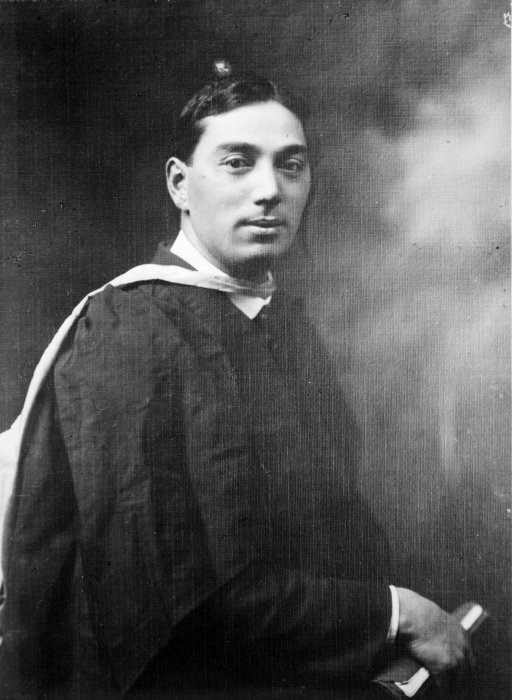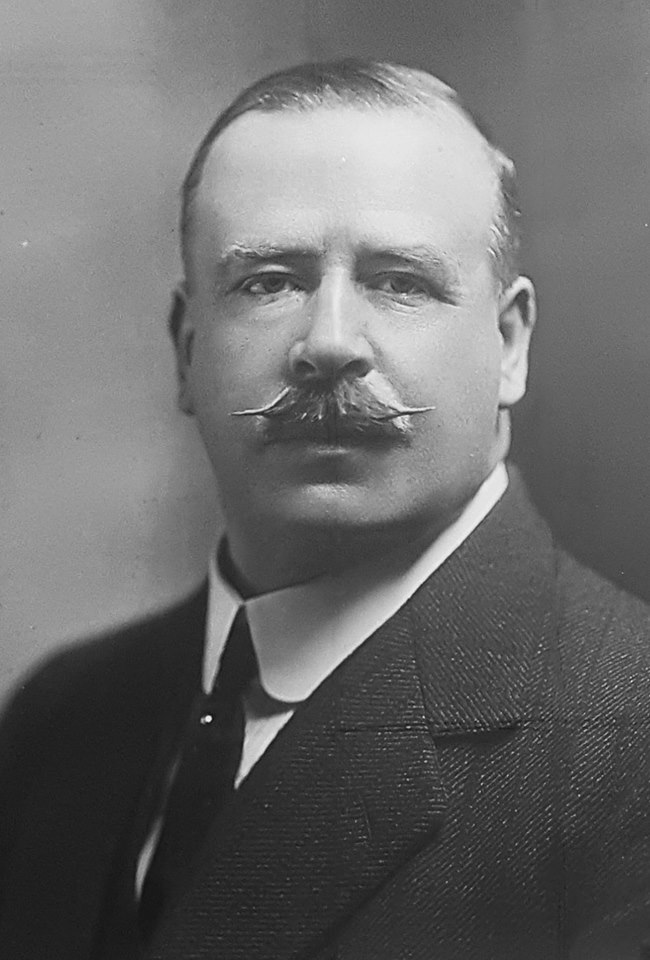|
Te Rangi Hīroa
Sir Peter Henry Buck (ca. October 1877 – 1 December 1951), also known as Te Rangi Hīroa or Te Rangihīroa, was a New Zealand doctor, military leader, health administrator, politician, anthropologist and museum director. He was a prominent member of Ngāti Mutunga, his mother's Māori iwi. Early life Peter Buck was born in Urenui, New Zealand, the only child of Anglo-Irish immigrant William Henry Buck and Rina, a Māori woman. William's wife Ngarongo-ki-tua had been unable to have children and, in line with Māori custom, Rina, one of Ngarongo's relatives, became part of the household and produced a child for the couple. Rina died soon after Peter was born, and Ngarongo raised him as her own. He claimed to have been born in 1880, but the register of the primary school he attended records October 1877, which is likely to be correct. Te Rangi Hīroa was descended on his Māori (maternal) side from the Taranaki iwi of Ngāti Mutunga. In his teens, his elders gave him th ... [...More Info...] [...Related Items...] OR: [Wikipedia] [Google] [Baidu] |
Urenui
Urenui is a settlement in northern Taranaki, in the North Island of New Zealand. It is located on State Highway 3 close to the shore of the North Taranaki Bight, 13 kilometres east of Waitara and 6 km south-west of Mimi. The Urenui River flows past the settlement into the North Taranaki Bight. Etymology The New Zealand Ministry for Culture and Heritage gives a translation of "great courage" for , noting that courage is "a figurative expression". A fuller explanation is that the name was given by Manaia in honour of his well-endowed son. means "penis", and means "large". History The town was the site of the Urenui Redoubt, created in winter 1865 during the Second Taranaki War. Originally envisioned as a settlement for Māori loyal to the colonial government, however by 1866 it was decided that the town should be a settlement for soldiers. Demographics Urenui is defined by Statistics New Zealand as a rural settlement and covers . It is part of the wider Tikorangi stati ... [...More Info...] [...Related Items...] OR: [Wikipedia] [Google] [Baidu] |
Māui Pōmare
Sir Māui Wiremu Pita Naera Pōmare (1875 or 1876 – 27 June 1930) was a New Zealand doctor and politician, being counted among the more prominent Māori political figures. He is particularly known for his efforts to improve Māori health and living conditions. However, Pōmare's career was not without controversy: he negotiated the effective removal of the last of Taranaki Maori land from its native inhabitants – some 18,000 acres – in a move which has been described as the "final disaster" for his people. He was a member of the Ngati Mutunga iwi originally from North Taranaki; he later lived in Wellington and the Chatham Islands after the 1835 invasion. Early life The date of Pōmare's birth is unclear—school records give 24 August 1875 but other sources give 13 January 1876. He was born at a pa near Urenui in Taranaki. His father, Wiremu Naera Pōmare, was of Ngāti Mutunga descent and his mother, Mere Hautonga Nicoll, was of Ngāti Toa descent. His maternal grandmo ... [...More Info...] [...Related Items...] OR: [Wikipedia] [Google] [Baidu] |
Niue
Niue (, ; niu, Niuē) is an island country in the South Pacific Ocean, northeast of New Zealand. Niue's land area is about and its population, predominantly Polynesian, was about 1,600 in 2016. Niue is located in a triangle between Tonga, Samoa, and the Cook Islands. It is 604 kilometres northeast of Tonga. The island is commonly referred to as "The Rock", which comes from the traditional name "Rock of Polynesia". Niue is one of the world's largest coral islands. The terrain of the island has two noticeable levels. The higher level is made up of a limestone cliff running along the coast, with a plateau in the centre of the island reaching approximately 60 metres (200 feet) above sea level. The lower level is a coastal terrace approximately 0.5 km (0.3 miles) wide and about 25–27 metres (80–90 feet) high, which slopes down and meets the sea in small cliffs. A coral reef surrounds the island, with the only major break in the reef being in the central western coast, ... [...More Info...] [...Related Items...] OR: [Wikipedia] [Google] [Baidu] |
Cook Islands
) , image_map = Cook Islands on the globe (small islands magnified) (Polynesia centered).svg , capital = Avarua , coordinates = , largest_city = Avarua , official_languages = , languages_type = Spoken languages , languages = , ethnic_groups = , ethnic_groups_year = 2016 census , demonym = Cook Islander , government_type = , leader_title1 = Monarch , leader_name1 = , leader_title2 = 's Representative , leader_name2 = Sir Tom Marsters , leader_title3 = Prime Minister , leader_name3 = Mark Brown , leader_title4 = President of the House of Ariki , leader_name4 = Tou Travel Ariki , legislature = Parliament , sovereignty_type = Associated state of New Zealand , established_event1 = Self-governance , established_date1 = 4 August 1965 , establi ... [...More Info...] [...Related Items...] OR: [Wikipedia] [Google] [Baidu] |
The Evening Post (New Zealand)
''The Evening Post'' (8 February 1865 – 6 July 2002) was an afternoon metropolitan daily newspaper based in Wellington, New Zealand. It was founded in 1865 by Dublin-born printer, newspaper manager and leader-writer Henry Blundell, who brought his large family to New Zealand in 1863. With his partner from what proved to be a false-start at Havelock, David Curle, who left the partnership that July, Henry and his three sons printed with a hand-operated press and distributed Wellington's first daily newspaper, ''The Evening Post'', on 8 February 1865. Operating from 1894 as Blundell Bros Limited, his sons and their descendants continued the very successful business which dominated its circulation area. While ''The Evening Post'' was remarkable in not suffering the rapid circulation decline of evening newspapers elsewhere it was decided in 1972 to merge ownership with that of the never-as-successful politically conservative morning paper, '' The Dominion'', which belonged to ... [...More Info...] [...Related Items...] OR: [Wikipedia] [Google] [Baidu] |
Bay Of Islands (New Zealand Electorate)
Bay of Islands is a former New Zealand parliamentary electorate. It existed during various periods between 1853 and 1993. It was thus one of the original 24 electoral districts, and New Zealand's first ever MP was elected, although unopposed, in the Bay of Islands; Hugh Carleton thus liked to be called the Father of the House. Population centres The previous electoral redistribution was undertaken in 1875 for the 1875–1876 election. In the six years since, New Zealand's European population had increased by 65%. In the 1881 electoral redistribution, the House of Representatives increased the number of European representatives to 91 (up from 84 since the 1875–76 election). The number of Māori electorates was held at four. The House further decided that electorates should not have more than one representative, which led to 35 new electorates being formed, and two electorates that had previously been abolished to be recreated, including Bay of Islands. This necessitated a major ... [...More Info...] [...Related Items...] OR: [Wikipedia] [Google] [Baidu] |
1914 New Zealand General Election
The 1914 New Zealand general election was held on 10 December to elect a total of 80 MPs to the 19th session of the New Zealand Parliament. The Maori vote was held on 11 December. A total number of 616,043 voters were registered, of which 84.7% voters turned out to vote. The election saw William Massey's Reform Government maintain power. The second-ballot voting system had been repealed in 1913, and first-past-the-post voting reinstated for the 1914 election. Soldiers serving overseas in the NZEF were given a vote by the Expeditionary Forces Voting Act, 1914. They voted for a party ( Liberal, Labour or Reform Reform ( lat, reformo) means the improvement or amendment of what is wrong, corrupt, unsatisfactory, etc. The use of the word in this way emerges in the late 18th century and is believed to originate from Christopher Wyvill's Association movement ...) and their votes were allocated to a candidate for their electorate by a representative of their party; which sometim ... [...More Info...] [...Related Items...] OR: [Wikipedia] [Google] [Baidu] |
James Carroll (New Zealand Politician)
Sir James Carroll ( Māori: Timi Kara; 20 August 1857 – 18 October 1926), was a New Zealand politician of Irish and Ngāti Kahungunu descent. Beginning his career as an interpreter and land agent, Carroll was elected to the Eastern Maori seat in 1887. He was acting Colonial Secretary (equivalent to the Minister of Internal Affairs) from 1897 to 1899. He was the first Māori to hold the cabinet position of Minister of Native Affairs, which he held between 1899 and 1912. He was held in high regard within the Liberal Party and was acting prime minister in 1909 and 1911. Early life James Carroll was born at Wairoa, one of eight children of Joseph Carroll, born in Sydney of Irish descent, and Tapuke, a Māori woman of the Ngāti Kahungunu tribe (or ''iwi'' in the Maori language). He was educated both at whare wananga (traditional Māori college) and the Wairoa native school but left early to be a farm worker. In 1870, while no more than thirteen, he was part of the Māori force p ... [...More Info...] [...Related Items...] OR: [Wikipedia] [Google] [Baidu] |
Member Of Parliament
A member of parliament (MP) is the representative in parliament of the people who live in their electoral district. In many countries with Bicameralism, bicameral parliaments, this term refers only to members of the lower house since upper house members often have a different title. The terms Member of Congress, congressman/congresswoman or Deputy (legislator), deputy are equivalent terms used in other jurisdictions. The term parliamentarian (other), parliamentarian is also sometimes used for members of parliament, but this may also be used to refer to unelected government officials with specific roles in a parliament and other expert advisers on parliamentary procedure such as the Senate Parliamentarian in the United States. The term is also used to the characteristic of performing the duties of a member of a legislature, for example: "The two party leaders often disagreed on issues, but both were excellent parliamentarians and cooperated to get many good things done." ... [...More Info...] [...Related Items...] OR: [Wikipedia] [Google] [Baidu] |
Hone Heke Ngapua
Honing is a kind of metalworking. Hone may also refer to: * Hone (name) (incl. Hōne), a list of people with the surname, given name or nickname * Hõne language, spoken in Gombe State and Taraba State, Nigeria * Hône, Italy {{dab ... [...More Info...] [...Related Items...] OR: [Wikipedia] [Google] [Baidu] |
1911 New Zealand General Election
The 1911 New Zealand general election was held on Thursday, 7 and 14 December in the general electorates, and on Tuesday, 19 December in the Māori electorates to elect a total of 80 MPs to the 18th session of the New Zealand Parliament. A total number of 590,042 (83.5%) voters turned out to vote. In two seats ( Eastern Maori and Gisborne) there was only one candidate (not one seat, as in Wilson). Outcome The result was that the Liberal Party, which had won a majority of seats (50 of 80) in Parliament, lost 17 seats and its majority, winning only 33. The Reform Party gained 9 to obtain a plurality (37) of seats. , Elections.org Liberal Prime Minister |







